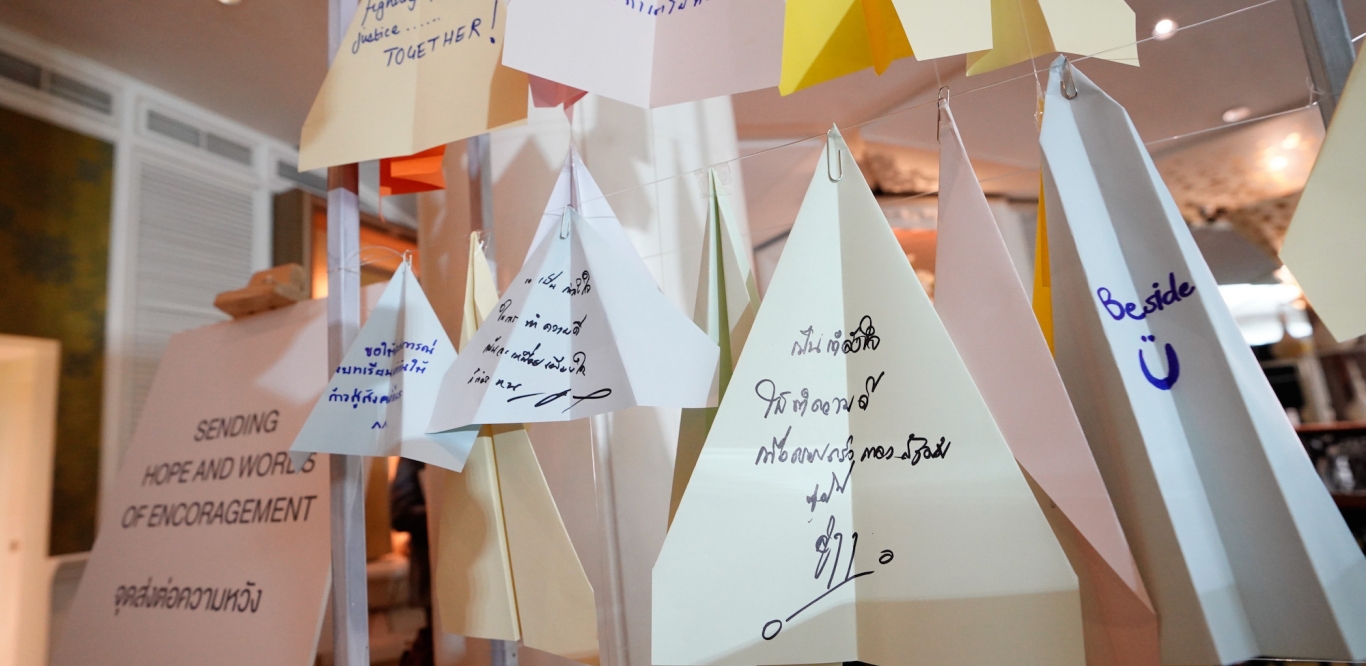TIJ invites all sectors to the 8th anniversary of the Bangkok Rules
Promoting Non-Custodial Measures as alternative for repentant prisoners
TIJ in partnership with the Kamlangjai (Inspire), a project under the royal patronage of Her Royal Highness Princess Bajrakitiyabha, held a special event on the 8th Anniversary of the UN Bangkok Rules under the topic “From Prison to the Community: Advancing Partnerships towards Justice and an Inclusive Society”.
Over the past decade, The Bangkok Rules have been widely accepted as norm for women in correctional services since they address gender specific needs in the criminal justice system and safeguard respect of human rights. Under the direction of Her Royal Highness Princess Bajrakitiyabha, Thailand has promoted the adoption of the Bangkok Rules among United Nations Member States since 2010. The reform is a major paradigm shift in the criminal justice system, with respect to female offender rehabilitation and social reintegration.
At the event, opening remarks were given by Air Chief Marshal Prajin Juntong, Deputy Prime Minister and Minister of Justice followed by Model Prison Certificate Ceremony awarded to the Nakhon Ratchasima Central Prison and Rattanaburi Prison, Surin Province; and Crafting Hope Awards to private organizations for their commitment to assist former offenders after prison release.
The discussion covered 3 dimensions:
Inside Prison which delves into the role of prison and changes within offenders while doing their time and how the Bangkok rules can protect the rights of women inmates and enhance their standard of life.
Beyond Prison discusses crucial roles of people, communities and society at large in supporting social reintegration of offenders once they are released.
Besides Prison envisages Non-Custodial Measures as alternative to imprisonment for repentant prisoners. The legal dimension should be carefully considered since legal and probation officers can accelerate the adoption of the Bangkok Rules.
The Bangkok Rules depart from the tradition of women prisoners treatment, by stating that prison should also provide psychological rehabilitation, engagement in occupational activities as well as look for new ways to promote social reintegration and end discrimination. Despite the concerted efforts, Thailand has the 9th* highest number of women offenders, making prison overcrowding one of the most pressing issues in Thailand justice system. Over 70 percent of female inmates in Thailand are convicted of drug-related offences often caused by personal neglect and disadvantaged social and economic conditions. However, most of them pose no threat to society. On this matter, the Non-Custodial Measures are a way to encourage rehabilitation and deal with the issue of prison overcrowding. Eventually, every sector should put in place measures to actively assist offenders and prepare for their return to society.
Prof. Dr. Kittipong Kittayarak, Executive Director, TIJ, argued “The Bangkok Rules provide a comprehensive set of standards for the treatment of female offenders. At this 8th anniversary event we expect all sectors i.e., the public, private and civil society to come together to successfully implement the reform and educate people in the community to welcome back offenders and avoid discriminatory practices. The work, above all, cannot be successfully carried out by prison authorities alone.”
Two sections were held in parallel; the first was a panel discussion under the topic “ From Prison to the Community: Advancing Partnerships towards Justice and an Inclusive Society” and the second section was an exhibition showcasing achievements from Kamlangjai project, Department of Corrections, Department of Probation, Penal Reform International - United Kingdom and UNAFEI -Japan. In addition, there are booths from model prisons and social enterprises that support ex-offenders’ business.
Participants and speakers from public, private sector and civil society include;
- Mr. Charn Wachiradech, Prison Warden of Chanthaburi Prison
- Dr Poonchai Chitanuntavitaya, Chief Medical Officer of Social Health Enterprise (SHE) and the Founder of “Halfway House”, a bridge organization offering employment support to prisoners by building trust between employers since inside prison stage.
- Prof. Takuya Furuhashi, Representative from the United Nations Asia and Far East Institute (UNAFEI), Japan
- Dr. Barbara Owen, Criminologist and Expert in the Treatment of Women Prisoners, USA
- Mr. Wacharapong Poomchuen, Representative from Inspire Project and Academia at Northern Substance Abuse Center, Chiang Mai University
- Dr. Chanettee Tinnam, Representative from Media sector and Lecturer, Faculty of Communications Arts, Chulalongkorn University
- Mr. Komol Prompang, Director, Strategy and Planning division, Ministry of Justice
- Dr. Supakit Yampracha, Vice President, The Courts of Justice
- Asst. Professor Jutarat Euaumnuay, Lecturer, Faculty of Political Science, Chulalongkorn University
TIJ and Kamlangjai expected that the 8th anniversary of the Bangkok Rules celebration would bring together a better cooperation from various sectors and generate more solutions for rehabilitation and social reintegration. This, in turn, will help prevent recidivism, leading to a safer and sustainable society.



